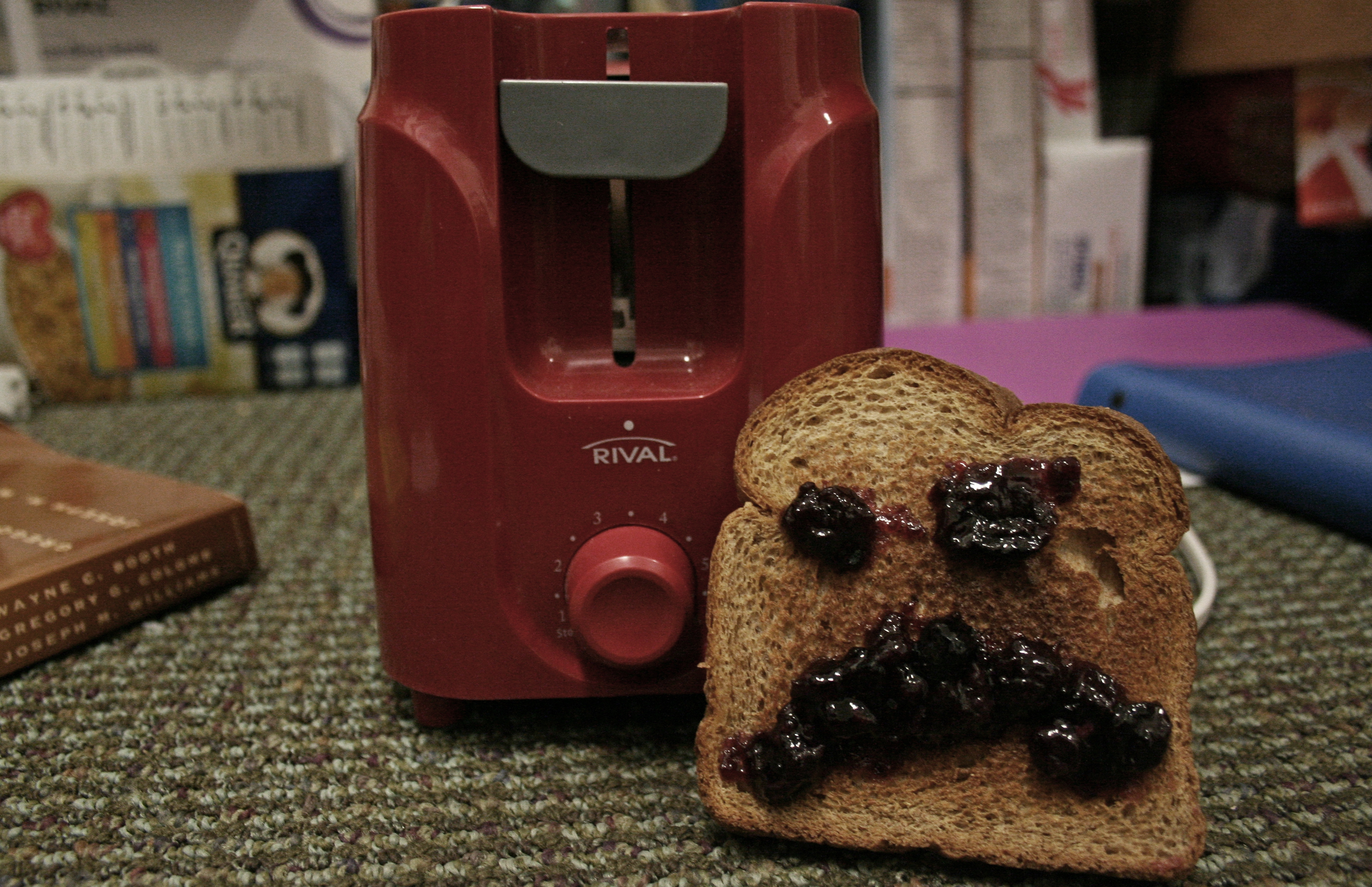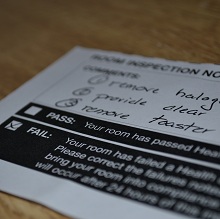Toasters' 'propensity to create fires' results in ban

Students living in apartment-style suites with kitchens are no longer allowed to have toasters. Toasters and toaster ovens are now banned in all on-campus residences. (Photo illustration, Christian Watkins)
Toasters and toaster ovens have been deemed unsafe for all on-campus residences, according to the Assistant Director of Residential Safety and Emergency Preparedness Zachary Pope.
The new safety policy regarding toasters and toaster ovens, which now applies to both traditional dorms and residences with kitchens, is just beginning to be enforced with resident advisors instructing students to remove the appliances, according to Pope.
“Residential students are being asked to remove these appliances because of their propensity to create fires,” wrote Pope in an email to C2M.
Up until this semester, a distinction was made between traditional dorms and apartment-style suites with full kitchens.
“The only change being been made to the Resident Student Handbook is the prohibiting of toasters and toaster ovens in full apartment style communities as well [as traditional dorm residences],” wrote Pope.
According to Pope, a revision of current language in the student handbook is being worked on and will be emailed to students before winter break.
Until the start of the spring semester, no judicial action will be taken against students in violation of the toaster ban, although students were asked to remove the appliance during safety inspections.
 As many as 120 students failed residence hall safety inspections because they had a toaster. (Kevin Loker)
As many as 120 students failed residence hall safety inspections because they had a toaster. (Kevin Loker)
“Right now we want to make sure the change is happening,” said Pope. “No judicial actions are being taken this [fall] semester.”
Pope highlighted the June recall of 300,000 toaster units manufactured by Hamilton Beach as an example of the potential hazards created by the appliance. According to documentation provided by Pope, the recall was issued by the Consumer Product Safety Commission because “the heating element in these toasters can remain energized indefinitely when an item is placed in the toaster which may ignite the contents, posing a fire hazard if the toaster is near flammable items.”
Pope said the recall of Hamilton Beach toasters is one example of “a large number” of toaster manufacturers “across the board” that have been a part of Consumer Product Safety Commission research.
Pope said research provided by the Consumer Product Safety Commission and a review of the safety procedures adopted by peer institutions contribute to the policies enacted by Mason.
According to Pope, as many as 120 students, including those living in traditional and apartment-suite style residences, failed safety inspections carried out during the fall semester because of their toasters.
Pope emphasized this procedure won’t result in judicial action for those living in an apartment with a full kitchen, but is part of an effort by Housing and Residence Life to relay the information and follow up with students now to make them aware of the changing policy.
Joseph Butt, a sophomore living in the Potomac Heights residence hall, said he “found it kind of silly” that students who live in an apartment with a full kitchen, equipped with a conventional oven, would be disallowed the use of toasters.
“They give us an oven but not a toaster,” said Butt. “I found [the decision to ban toasters] kind of silly.”
Although he lives off-campus, junior David Rosenberg said he thinks owning and operating a toaster is a right students should have on campus.
“If someone wants to buy a toaster and put it in their dorm room, they should be able to,” said Rosenberg.
Butt said he can understand the logic behind banning toasters as a safety precaution but doesn’t understand the decision in light of some of the responsibilities already granted to students who live in an apartment with a full kitchen.
“I can understand why toasters are being banned because they can cause fires really easily, but we’re adults,” said Butt. “They might as well take my oven too.”
In response, Pope said there is a distinction made between what is safe for students to bring into residence halls and mechanisms which are put in place and monitored by the university.
“If an appliance such as a traditional stove top is provided by the university there are mechanisms in place for its maintenance, monitoring of recalls, and periodic cleaning,” wrote Pope in an email.
Even if certain toasters have been deemed unsafe, such as the recalled Hamilton Beach model, Butt said he can’t recall a time when a toaster triggered a safety concern in his building.
“Our neighbors have burnt something on a stovetop and set off an alarm,” said Butt. “I’ve never heard a fire alarm going off because of a toaster.”
Butt said after receiving a failed inspection notice following a safety check conducted by the Housing office, he and his suitemates had 48 hours to remove their toaster before a follow-up inspection would be conducted. Despite the notice, Butt said he doesn’t remember his Resident Advisor, or any other Housing official, following up on the failed inspection.
In addition to the enacting a ban on toasters and toaster ovens, Pope said his office is currently discussing a potential ban on all “open-coil” electric appliances.
“We’re in conversation and weighing our options,” said Pope.
While the toaster policy may be a surprise to some students at Mason, the policy isn’t one-of-its-kind. In fact, local Virginia and metro-area institutions seem to be split in their decision on whether or not to ban the appliances.
Christopher Newport University, James Madison University, American University and the University of Maryland are among area institutions that have adopted a ban on toasters and toaster ovens.
William and Mary, Virginia Commonwealth University, Old Dominion University, and George Washington University all permit the use of toasters in kitchen areas.
Lindsay Robinson, a freshman living in the Wilson residence hall in President’s Park, a traditional-style dorm building, said she doesn’t think the ban is that big of deal.
“I personally don’t think it’s a huge problem,” said Robinson. “I don’t have a toaster.”
C2M Executive Editor Kevin Loker contributed to this story.
